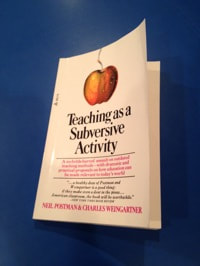The Versatile ELT BlogA space for short articles about topics of interest to language teachers.
Subscribe to get notified of
|
Once you have learned how to ask questions, you have learned how to learnThe title of this post comes from Postman and Weingartner's influential book, Teaching as a Subversive Activity (1969). This thinking can be applied to the study and teaching of any subject. In terms of language learning, it is safe to say tht once students are equipped with new linguistic concepts, they can formulate hypotheses and develop a new range of questions that can then be explored in texts. They write: Knowledge is produced in response to questions. And new knowledge results from the asking of new questions; quite often new questions about old questions. Here is the point: once you have learned how to ask questions – relevant and appropriate and substantial questions – you have learned how to learn and no one can keep you from learning whatever you want or need to [1] know. Their statement, once you have learned how to ask questions, you have learned how to learn, could be a poster in every staffroom in the world. Learning how to learn lies at the heart of the metacognitive dimension of Bloom’s Taxonomy. Producing one’s own knowledge accords with Vygotsky’s knowledge creation and it happens through the data-information-knowledge. Postman and Weingartner’s fifty year-old revolutionary little book remains remarkably relevant. In their chapter, What's worth knowing, the authors bombard us with pages of questions that teachers could well discuss with their students. The first set of questions extracted below, prompts students to consider the nature of change, which they really should ponder if they are going to be subverted! What is 'progress'? What is 'change'? What are the most obvious causes of change? What are the least apparent? What conditions are necessary in order for change to occur? What kinds of changes are going on right now? Which are important? How are they similar to or different from other changes that have occurred? The second extract deals with relationships, another leitmotif of Learning Language from Language (the name of my unfinished book from which this blog post is extracted). What are the relationships between new ideas and change? Where do new ideas come from? How come? So what? If you wanted to stop one of the changes going on now (pick one), how would you go about it? What consequences would you have to consider? The third extract relates to the fundamental importance of language. What does man's language permit him to develop as survival strategies that animals cannot develop? How might man's survival activities be different from what they are if he did not have language? What other 'languages' does man have besides those consisting of words? What functions do these 'languages' serve? Why and how do they originate? Can you invent a new one? How might you start? The final extract contains questions about questions and questioning. They are for teachers to ask themselves. Will your questions increase the learner's will as well as his capacity to learn? Will they help to give him a sense of joy in learning? Will they help to provide the learners with confidence in his ability to learn? In order to get answers, will the learner be required to make inquiries? (Ask further questions, clarify terms, make observations, classify data, etc.?) Does each question allow for alternative answers (which implies alternative modes of inquiry)? Will the process of answering the questions tend to stress the uniqueness of the learner? Would the questions produce different answers if asked at different stages of the learner's development? Will the answers help the learner to sense and understand the universals in the human condition and so enhance his ability to draw closer to other people? Processing such questions leads to ditching old modes of thinking and replacing them with new modes of thinking, the very definition of subversion.
1 Comment
Said MERABTENE
3/3/2024 10:56:38
Thank you for sharing this invaluable reflection, James.
Reply
Leave a Reply. |
To make a comment, click the title of the post.
Archives
July 2024
Categories
All
|


